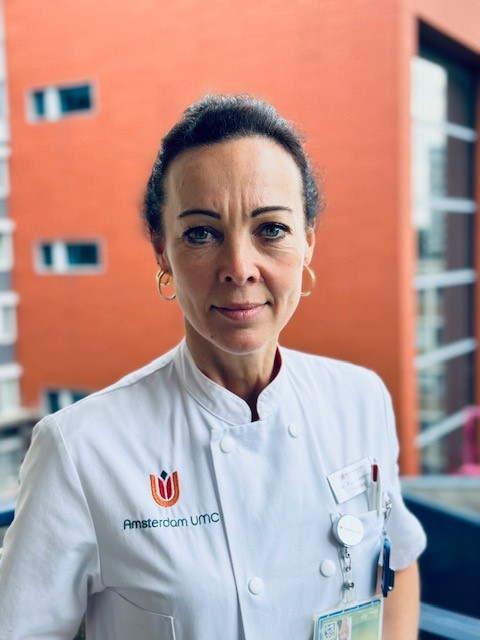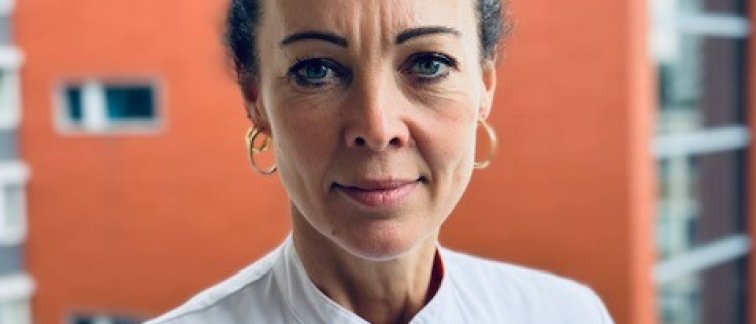According to Patricia Zondervan, removing a whole kidney is easy and quick, but gives a kind of false security. "In the long run, it is better to spare the kidney, especially in patients with cardiovascular disease or diabetes. Poor kidney function can make these diseases worse."
To operate or not to operate? The patient's decision
Suppose a patient with a 3-centimeter kidney tumor is referred to Amsterdam UMC from another hospital for kidney-sparing surgery. Zondervan explains, "We then always discuss all treatment options with the patient first: active monitoring and treatment as it grows, partial nephrectomy (removing part of the kidney, ed.) or, for example, cryo-ablation, in which the kidney tumor is frozen. This is a treatment almost as good as surgery. The trick is to inform the patient in such a way that they can already make a choice; as a urologist you are purely supportive," says Zondervan.
Zondervan also regularly sees patients referred to Amsterdam UMC for removal of the entire kidney. "Often the tumor can then still be removed kidney sparingly. I discuss this with the patient and together we weigh the pros and cons. The patient ultimately chooses a partial nephrectomy, which ultimately leaves them with better kidney function."
Difference in treatments in the Netherlands
Zondervan and her colleagues recently published a study on the differences in treatment of kidney cancer in the Netherlands. "We see that hospitals that frequently treat kidney cancer, often operate to save the kidney. Hospitals with less experience more often remove the whole kidney. We also saw that some regions offer very one-sided kidney cancer care. We suspect that here there is less shared decision-making in the consulting room."
Standardization throughout Europe
Kidney-sparing surgery such as a partial nephrectomy is complex and is not done everywhere. Amsterdam UMC specializes in this. Zondervan organizes international and national courses and laparoscopy and robot training to improve and standardize the surgical technique in Europe.
Everyone thinks along
Together with fellow urologists from OLVG and AVL, Zondervan founded the Kidney Cancer Network Amsterdam (NKNA). Here, urologists discuss every patient with kidney cancer weekly in a multidisciplinary consultation. "This has been running like clockwork for 7 years," says Zondervan. "Because of this collaboration, there is more shared decision-making demonstrated, more patients are participating in studies and the collaboration between urologists and oncologists has improved."
Zondervan is dual chair of the national tumor workgroup Dutch Renal Cancer Group (DRCG). "In this workgroup, every kidney cancer practitioner has a say. We think well and productively about issues together, creating support for national working agreements."
In addition, Zondervan, together with Adriaan Bins, oncologist from Amsterdam UMC, established the national registry PRO-RCC to track patients with kidney cancer. "We ask patients about their quality of life and they also have an app on which they can report side effects. The approach of both the DRCG and PRO-RCC is multidisciplinary. The urologist, oncologist, radiotherapist and interventional radiologist talk to each other about the patient."

Concentration for better care
The Integral Care Agreement (IZA) has set up five "tumor tables" for concentration and distribution of care, including one on kidney cancer. Zondervan hopes this will lead to less fragmented care and more transparency: "The concentration of care deployed nationwide for kidney cancer by the Ministry of Health, Welfare and Sport may have another hand in optimizing kidney cancer treatment and the role of shared decision-making. The impact analysis hopefully shows that our proposed standard is achievable. Patient care and quality can improve that way, I am sure!"
This text was translated for Cancer Center Amsterdam. Find the original here: Gedeelde besluitvorming is een must bij nierkanker (tulpintranet.nl)

